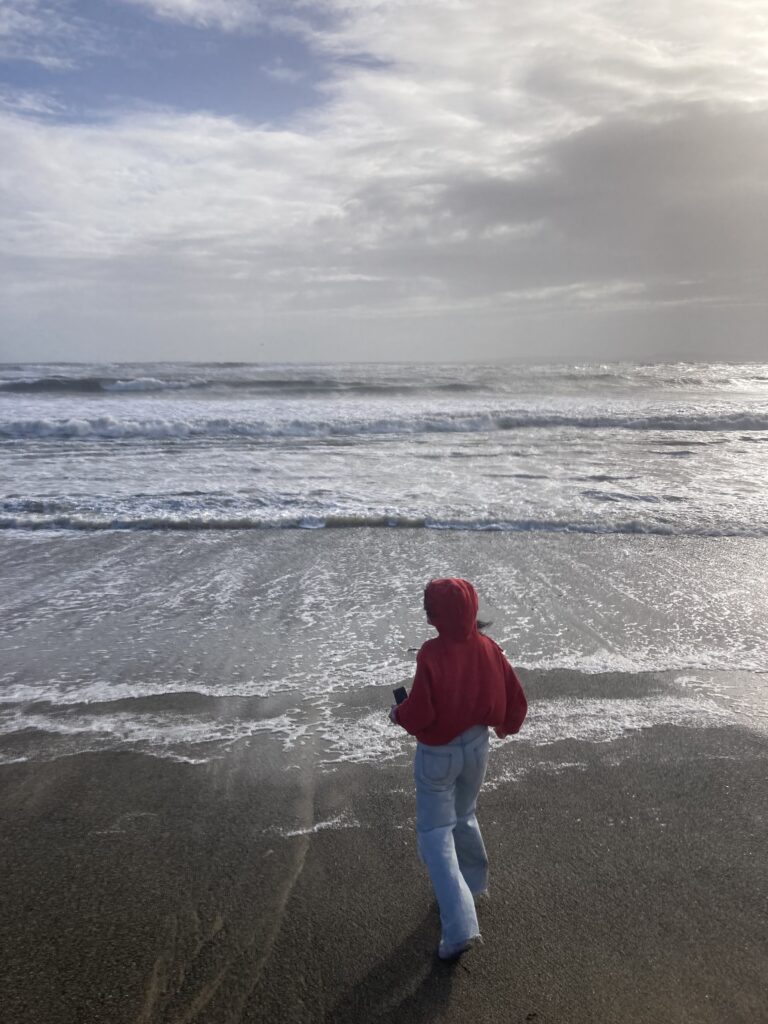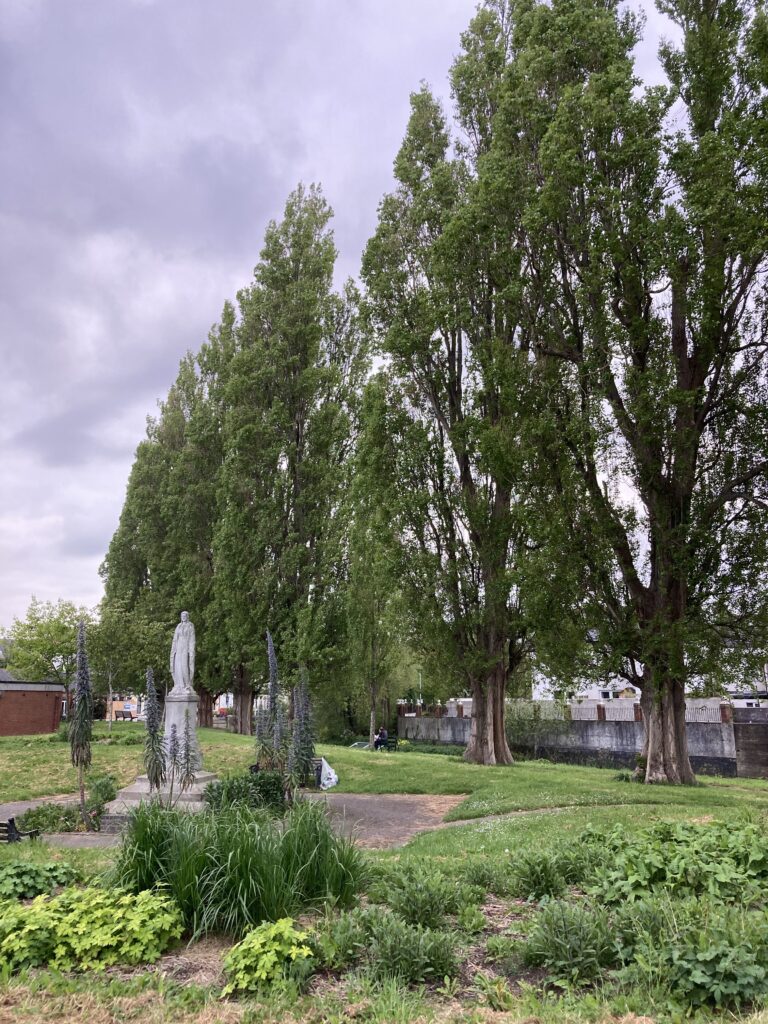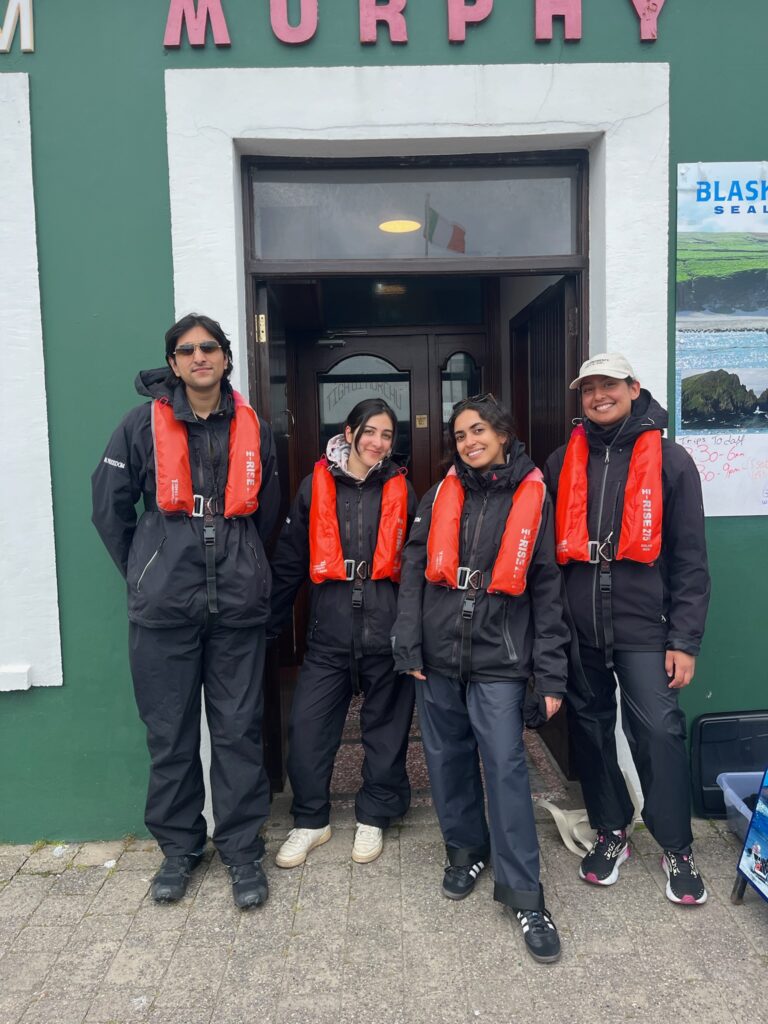
A morning dip in Dingle.
As I write this last post, I’ve come home from a study day in the Dun Laoghaire library. It’s probably one of my favourite places in Dublin – you can see the seaside (and Howth, across Dublin Bay) from its massive windows. Today, there was a sailing race which was promptly interrupted by a thunderstorm.
I’ve been preparing for my thesis, which will focus on Ireland’s 2017 climate assembly. Climate activists and deliberative democrats alike herald climate assemblies as the potential solution to break through political gridlock, leading to a proliferation of climate assemblies in Europe. Whether they actually enact said climate mitigation policies is another question. (It should be noted that Ireland’s climate assembly was the first in the world, making it a notable one to study.) Since coming to Dublin, I’ve been working as a research assistant for a multi-year project called “Communicative Deliberation for Climate Action,” or COMDEL, at DCU’s Future of Media, Journalism, and Democracy Institute. We’ve written several papers on climate assemblies and climate misinformation, and my thesis will serve as another paper for the project.
Witnessing citizens’ assemblies in Ireland has been both inspiring and humbling. It’s still remarkable to me how mainstream politicians have bought into a fairly radical idea of representation; yet some of their shortcomings are also more visible to me now. I briefly mentioned this in my first blog post but in October, I got to see the last session of the Assembly on Drugs. I’d been warned that the session was going to be dry, as it was just voting on the proposed recommendations. My expectations couldn’t be more wrong. At a bleary 8 AM in Malahide, a woman stood up and declared that the assembly was rigged. She voiced her discontent with the voting process, saying that RTE had already predicted what the assembly would recommend. What was the point?
A PhD student in COMDEL and I were talking about citizen accountability the other day. She proposed that citizens be involved in “meta deliberation,” or deliberating about what deliberations should take place and how. She cited the Ostbelgien Model in Belgium, where former assembly members serve on a Parliamentary committee and are tasked with both calling for new assemblies and setting their scope. In Ireland, politicians give assemblies wide mandates, but the specifics are drawn in by the civil servants running the assemblies. Of course, there could be a “turtles all the way down” problem: at what point do you stop deliberating about deliberations? But I understand her argument for more accountability. Without it, citizens’ assemblies are ineffective at solving issues and at worst, they risk becoming another instrumentalist tool for politicians. And agenda-setting powers matter: in the Drug Assembly, participants pointed out that the very mandate was about “stopping the harms of drugs” – which inherently pre-supposed that drugs have no medical benefits.
Living in a country which regularly enacts citizens’ assemblies has refined my perspective on their role in society. My undergraduate studies were inherently theoretical; there are very few citizens’ assemblies in America. When my classmates and I debated their merits, we relied upon our intuitions – and as a result, I was enamoured with the idea of assemblies as a “fix all” for contemporary ills of democracy. Ireland’s successful assemblies have improved – but not transformed – its democracy. This year’s riots and rise of anti-immigrant Independent candidates, for example, reveal that Ireland is not immune to the global rise of right-wing populism. Of course, I would simply argue that these problems stem from a lack of democracy. We need meaningful inclusion of citizens in policy-making, especially on salient issues like the housing crisis. Simply put, deliberative “mini-publics” have yet to scale up and transform the larger “maxi public.” In undergrad, I read theorists like Christina LaFont who warned against the creation of yet another privileged few via citizens’ assembly. Now, I see what she means: enlightening a mini-public only goes so far if the larger population isn’t engaged or aware of these debates.
Moreover, I’ve also considered tailoring democratising reforms for different types of policy-making. In the Drug Assembly, I noted that a lot of the recommendations were garnering over 90% support – but they also lacked teeth. One recommendation, for example, advocated to make the drug issue in Ireland a priority; another recommendation urged for the budget to be increased. Yet neither addressed the real controversies: what political issues will be put aside when prioritising drug policy? Where will the money in the budget be coming from? Ireland’s success stories come from decisions that are less bureaucratic and more constitutional. Abortion and same-sex marriage don’t involve details of implementation and budgeting. Yet there is a need for democratic oversight over these more bureaucratic kinds of decisions, even if it’s not citizens’ assemblies. I therefore no longer see assemblies as a “fix all,” but one part of a larger series of changes.
Witnessing a different political system has also challenged many of my assumptions about democracy. America’s representational woes stem from a first-past-the-post system which which allow little room for alternatives to succeed to the two (increasingly polarized) main parties. In Ireland, the problem is opposite: both mainstream parties are rooted in a historical cleavage and therefore vary little on most policies. Understanding the different problems with existing representation has meant I’ve had to think about what goals I might pursue back in the States differently – we aim towards decreased polarization, but what happens when there is too much consensus?
Getting to think about these kinds of questions every day has been such a joy. I still get excited when I find a cool paper, or when I get to work with individuals who have literally created these assemblies. It’s a pleasure to be around other people who care so much about this topic as well. There was certainly a loyal community of students at Yale who cared about CAs – mostly the ones who took the same Open Democracy class I did – and we’ve all stayed in touch over the years. But I’ve really enjoyed meeting a larger community of PhD students and academics, both in Ireland and abroad, who have devoted their actual careers to CAs. I think I’ll be moving back to the States next year – I miss home too much – but this year has made a profound impact on me, both professionally and personally.
Oh, and it turns out Ireland’s quite stunning in the spring. Left to right: West Cork with Freya; Drumcondra in Dublin; Mitchells go boating in Dingle.



